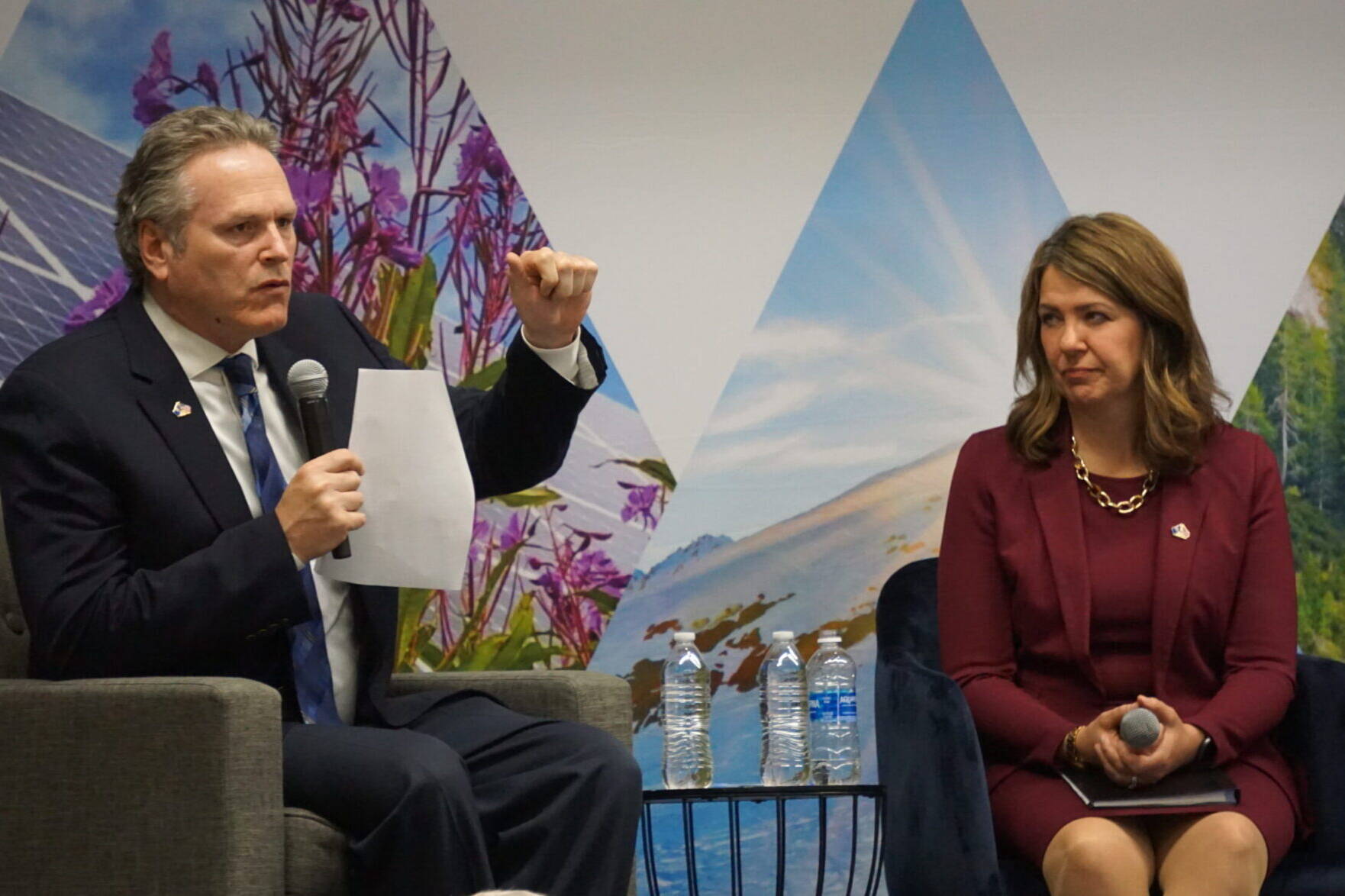Energy bills passed by the Alaska Legislature will help the state address natural gas supply problems in Southcentral’s Cook Inlet region and energy problems statewide, Gov. Mike Dunleavy said on Monday.
But he and his staff members are still poring over the details of the bills that passed and things that were left out, the Republican governor told reporters. In the latter category was a bill he introduced, House Bill 276 and Senate Bill 194, that would have reduced royalties for Cook Inlet natural gas and oil. A different royalty reduction bill, House Bill 223, passed the House but not the Senate.
Dunleavy, speaking to reporters gathered at a U.S. Department of Energy-sponsored event in Anchorage, said he has not decided what to do now about Cook Inlet royalty relief.
“Obviously, we wanted all of our bills to move and pass because we saw specific problems that we’re trying to solve,” he said. Examining the approved legislation will take a bit of time because several bills wound up being combined, he said. “And so, probably within the next week or so, it makes sense …to see what we’ll do with Cook Inlet in terms of incentivizing more gas production.”
Asked about the possibility of calling a special session on Cook Inlet royalty relief, Dunleavy was noncommittal.
“We’re going to take a look at what else was passed and what was left out to see what we need to do in the near future, what we need to get ready for next year,” Dunleavy said. The possibility of a special session “depends on, once we do our analysis of the bill, what that looks like.”
One important provision that did pass, he said, concerned regulating Cook Inlet natural gas storage. That will increase storage capacity in the region, he said.
That proposal was originally intruded in a standalone measure, Senate Bill 220, but wound up bundled with other energy provisions into a larger bill that was also about carbon capture, reserves-based lending and geothermal energy.
The carbon-storage provisions were originally proposed in a standalone bill the governor introduced last year. If signed by Dunleavy, the bill passed by the Legislature will enable the state to set up a regulatory framework for leasing what is known as “pore space” underground where carbon gases may be stored.
Related to that effort was a bill passed last year enabling the state to start a system of selling carbon credits to preserve sections of state-owned forested land. Regulations for those sales are still being made final, and potential buyers have shown interest, Dunleavy said.
“We have had a number of tire kickers, seat-sitters, look-under-the-engine people, but they’ve been waiting for the regs,” he said.
Discussions are ongoing with potential customers in Japan and other Asian allies that could help Alaska monetize carbon, he said.
Monday’s event at which Dunleavy spoke was a daylong energy meeting called Connecting the Arctic that was a prelude to this week’s Alaska Sustainable Energy Conference.
Dunleavy and Alberta Premier Danielle Smith both spoke about oil and gas production that is continuing in their regions even as they work to limit emissions of carbon gases. Scientists say the accumulation of those gases in the atmosphere creates a greenhouse layer that causes climate change.
“We’re transitioning away from emissions. We’re not transitioning away from production,” Smith told the meeting audience.
Compared to Alaska’s estimated remaining oil reserves of 3.6 billion barrels, Alberta has 1.2 trillion barrels of oil remaining, Smith said. At the same time, Alberta has available for storing carbon dioxide “the second-largest pore space in the world, aside from Russia,” she said. “And we’re a better friend and ally than Russia, even though they’re close.”
Alberta, like Alaska, is hoping to use those vast underground spaces for carbon storage, she said. “My officials tell me that we have enough pore space to capture, theoretically, all of the CO2 emissions that have already been produced by man so far.”
• Yereth Rosen came to Alaska in 1987 to work for the Anchorage Times. She has reported for Reuters, for the Alaska Dispatch News, for Arctic Today and for other organizations. She covers environmental issues, energy, climate change, natural resources, economic and business news, health, science and Arctic concerns. This story originally appeared at alaskabeacon.com. Alaska Beacon, an affiliate of States Newsroom, is an independent, nonpartisan news organization focused on connecting Alaskans to their state government.

